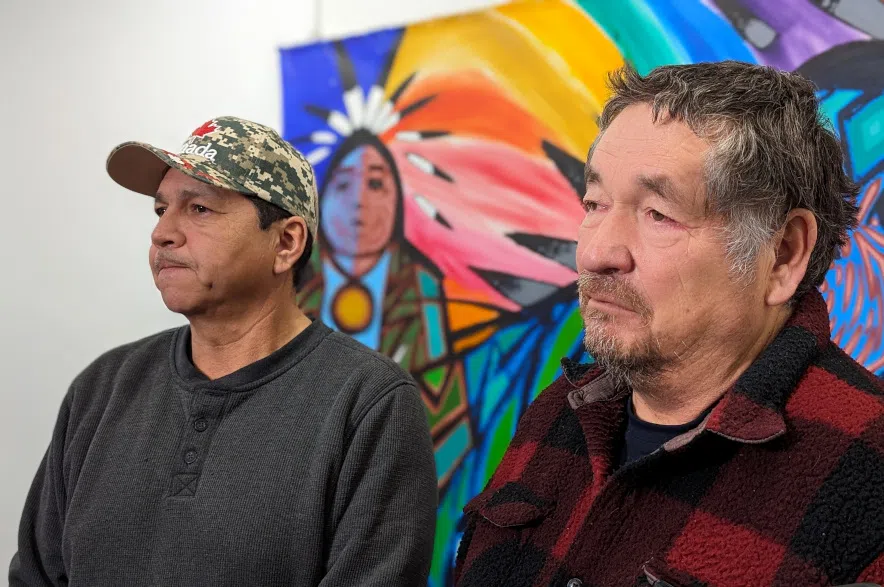The inquest into the stabbings on the James Smith Cree Nation and in Weldon is heading into its fourth day on Thursday, but at least two people from the community have some concerns.
Stewart Head doesn’t believe the questions he’s wanting to know about are getting addressed.
“I’m at a loss and I’m frustrated. Nobody wants to answer my questions, they’re not being answered properly, it’s like they’re passing the buck … and that don’t sit too well with me right now,” said Head.
He’d been listening to the first three days and said what he was hearing was heartbreaking.
“(What) our loved ones went through, our survivors, the injured, all the trauma that witnesses witnessed, that’s pretty horrifying. Our community’s broken and it’s been broken for the past year and a half and it’s hard to get a grasp on things at times,” explained Head.
But there are also things he wants to know, like what happened to his brother Christian Head’s truck – there were damage and blood stains that they couldn’t explain and when the question was asked during the inquest there weren’t any concrete answers given.
Several of the questions that have been asked by family during the inquest in the first few days have been deferred, with the witness saying that there would be a later person who would come to give evidence and could answer it better.
Darryl Burns has standing to ask questions on behalf of his late sister, Lydia Gloria Burns, and their family. He has several concerns about how things were handled before, during and after the stabbing rampage.
Burns believes Myles Sanderson should have been higher on the priority list to capture as a person unlawfully at large.
“Because of his record and because of his past – and he had a lot of violent offences on his record, so why wasn’t (the RCMP) doing a lot more looking for him,’ asked Burns.
Read More:
He also thinks if officers had looked a little harder they would have been able to find a more current picture of Damien Sanderson and maybe he would have been arrested the day before the stabbings began.
“I don’t know if enough was done to locate this guy,” Burns said with a big sigh.
Burns said there’s been a lot of confusion on the timeline and he and others have been looking to find out why it took so long for some things to get done in the response to the stabbings, he said it seems like the investigation has been rushed.
“For us there’s a lot of stuff there that’s missing,” he said.
Burns also didn’t seem too sure of the process altogether.
“The justice system is never ever been kind to us native people, so do we have faith in this justice system? Do we have faith in this (inquest)? I don’t think we do, I don’t think we do at all, because history to us has been very unjust,’ said Burns.
The security team
The new security team for the first nation was implemented after the stabbing attacks. Head is on sick leave now, but had been security supervisor.
On Wednesday, the inquest heard about the work the team does and how helpful they are for the RCMP.
Head said the relationship with RCMP is much better now, but it wasn’t good before the team was in place.
“The communication wasn’t there,” he said.
When the team is called, Head said the response is fast, just a few minutes before they can get to the site and lock things down. But there are limits to what the team is allowed to do – Head said they can’t chase after criminals, they have to observe and report, and they’re not trained in dealing with dangerous offenders or dealing with mental health, addictions, and drugs.
“We’re there just to protect our community but we’re thrown into this bucket where we have to deal.”
He said the workload is huge.
“It’s been a real challenge in the past year and a half to do our work and keep our community safe, we’re overwhelmed, we do everything from mental health, addictions, family violence, and it’s not getting any easier,” said Head.
That’s why Head wants there to be RCMP on the first nation 24-7, to help with all those problems.
Burn said the security team is a valuable service.
“You see those (security) trucks right away as soon as you get to the reserve and you know they’re there, and for me it brings me a sense of protection,” said Burns.
But he also recognizes the need for police, saying the security team are community members and their safety needs to be looked after too.
Both Head and Burns say drugs are a big problem on the first nation, as had been alluded to in the inquest evidence, and they want the community to come together to deal with it. Both are calling for the first nation’s chief and council to do more to lead the community and help make changes to bring the community forward.
The two are hoping such things are included in the recommendations that come out of the inquest.
Burns said he’s hopeful those recommendations will have some weight to them and that the “powers that be” actually implement them.











